About Us
About Malawi Irish Consortium on Gender Based Violence
The Malawi Irish Consortium on Gender Based Violence mirrors the Irish Consortium on Gender Based Violence (ICGBV) that was established in 2005 as a response to reports of ongoing and systematic sexual violence against women and girls in the Darfur Region of Sudan.
The Irish Consortium on Gender Based Violence (ICGBV) was born from an Irish based alliance of international human rights, humanitarian and development organisations who are leaders in the sector in terms of GBV prevention and response. Members include Action Aid Ireland, Concern Worldwide, Plan Ireland, World Vision Ireland, Tr?caire, GOAL, Irish Red Cross, Christian Aid Ireland, Oxfam Ireland, Self Help Africa, Irish Aid and Irish Defence Forces.
The ICGBV works together to increase knowledge and understanding of violence against women and girls, and to ensure high quality programming and policy responses, in both humanitarian and development settings. Collaboration between members at country level has been strongly encouraged to promote the following: shared learning and best practices; joint programming on preventing and responding to GBV; collaborative advocacy or research projects.
The Collaboration between the Malawi Irish Consortium on Gender Based Violence (MICGBV) and the Irish Consortium on Gender Based Violence (ICGBV) promotes shared learning and best practices: joint programming on preventing and responding to GBV and collaborative advocacy or research projects.
In 2014/2015 the Irish Consortium opened a call to provide match funding for collaborative projects on addressing Gender Based Violence in four countries, Malawi, Democratic Republic of Congo, Kenya and Great Syrian region.
In Malawi, in 2014, Concern Worldwide, GOAL, Self-Help Africa and Trocaire, in collaboration with the Irish Embassy organized a photographic exhibition during the 16 Days of Activism which coincided with a State visit from Irish President Michael D Higgins. While no funding came from the ICGBV, the exhibition was brought to Ireland for the 16 Days commemoration in Dublin.
Building on the success of the 2014 event in Dublin, the ICGBV members in Malawi successfully applied for ICGBV matched funding to hold 16 Days of Activism activities at national level in consecutive years from 2015 up to and including 2019. Over the years, other organizations joined the group and it is currently comprised of 7 members, with UN Women working with the group as a coordinating UN agency on 16 days of activism campaign.
Since 2014, the Consortium has been coming together to commemorate the 16 Days of Activism against GBV and beyond that the Consortium works together with the Government of Malawi and other like- minded institutions in responding to GBV and promotion of gender equality. The Consortium aims to promote evidence-based programming on gender equality and GBV and support the work that the Government of Malawi is doing through the Ministry of Gender, Community Development and Social Welfare.
The Malawi Irish Consortium from 2014-2021 before the Formal Secretariat
In 2014 the MICGBV in collaboration with the Irish Embassy organized a photo exhibition and created informational booklets on the topic of women as agents of change in reducing violence against women and girls.
In 2015, a second iteration of these events focused on engaging men as agents of change against GBV.
Beginning in 2016, the MICGBV expanded its reach for 16 Days of Activism to include advocacy in addition to awareness raising.
In partnership with Theatre for a Change (TFaC), a Malawian NGO, and UN Women, the MICGBV m has done a series of interactive radio programmes and advocacy events involving national-level stakeholders.
Each year has shone the spotlight on different GBV-related topics, including the right to live free from violence (2016), marital rape (2017), and GBV in the agricultural value chain (2018). All programming was backed up by qualitative research conducted by organisations in the Malawi Consortium.
The Consortium organised a High-Level National Event in 2019 where 240 people were present at this event, including MICGBV members, MICGBV district and national level partners, women workers, and young women.
The MICGBV Chairperson, ActionAid Malawi Executive Director, Assan Golowa provided opening remarks, and the guest of Honour was the Minister of Gender, Children, Disability and Social Welfare, Honourable Mary Thom Navicha and the Irish Ambassador, His Excellency Gerry Cunningham gave a keynote address.
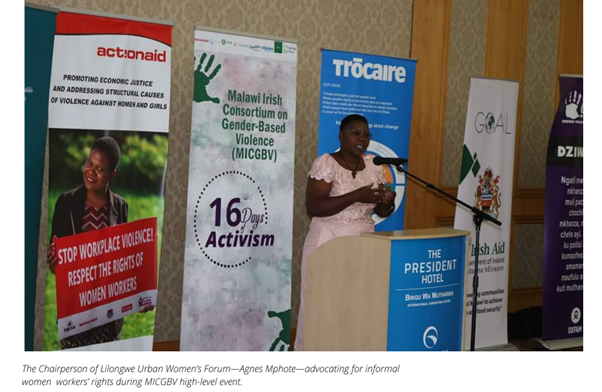
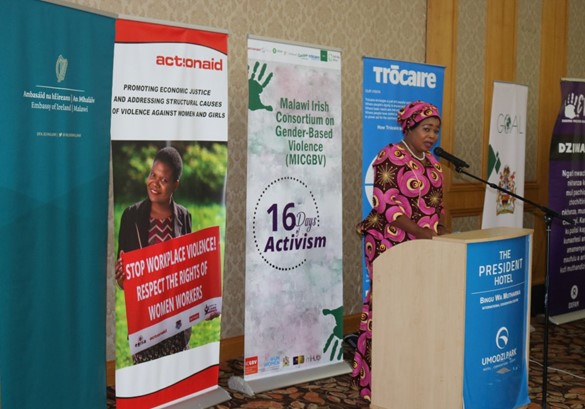
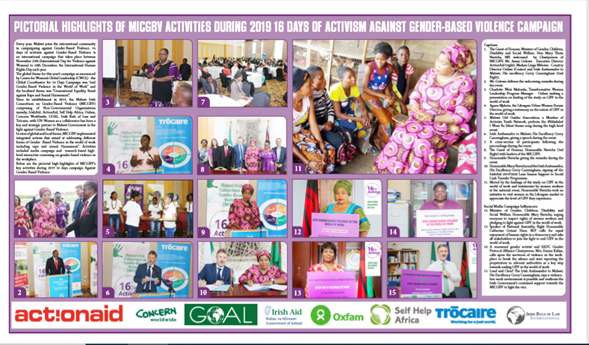
In 2020, the Consortium Organised a High Level Virtual Meeting on 16 Days of Activism.
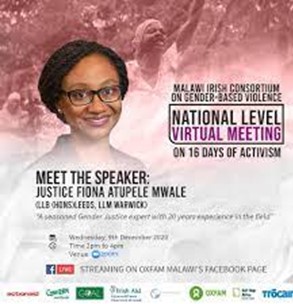
In 2021, the Malawi Irish Consortium on Gender Based Violence organized High-level Panel Discussion on accountability in Gender Programming and Food Systems Summit
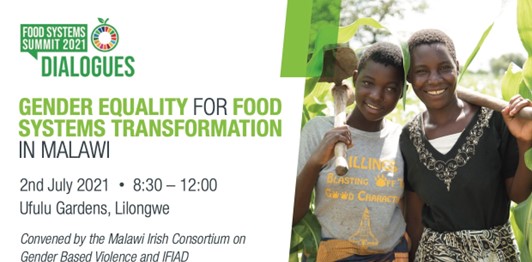
The MICGBV organized a panel discussion to spark conversations between stakeholders working on GBV prevention programming in Malawi.
The objective of the panel discussion was to spark conversations between stakeholders working on GBV prevention programming in increasing accountability to improve gender-based violence case resolutions.?
The panel discussion was strategically set up during the 16 Days of activism against Gender Based Violence to raise awareness and advocacy on GBV initiatives.

Objective
The MICGBV aims to promote evidence-based programming on gender equality and Gender Based Violence (GBV) and support the relevant work of the Government of Malawi through the Ministry of Gender, Community Development and Social Welfare and other key stakeholders.
Specific objectives
The MICGBV strives to achieve its objectives through:
i. Sharing learning and best practices grounded in evidence among the members and externally with relevant stakeholders.
ii. Identifying and exploring opportunities to work collaboratively to conduct research, to develop programme approaches and implement initiatives to promote gender equality and respond to gender-based violence.
iii. Joint advocacy: becoming a credible voice with a significant influence on policy and practice in relation to GBV and other gender issues, based on high‐quality evidence / research and learning from the work of its members at field level.
Further strengthen the Consortiums advocacy capabilities to complement the work of existing national gender coordinating groups (and local CSOs.
iv. Coordination and linkages: establishing linkages with other GBV/gender platforms for joint advocacy purposes and local capacity building, as relevant, of the same.
Overall, the Secretariat strategically positions the Consortium to be a stronger Malawi actor on GBV prevention and response, influencing policy and legislation and better advocating for change, while also linking up and strengthening local actors on ending GBV.
